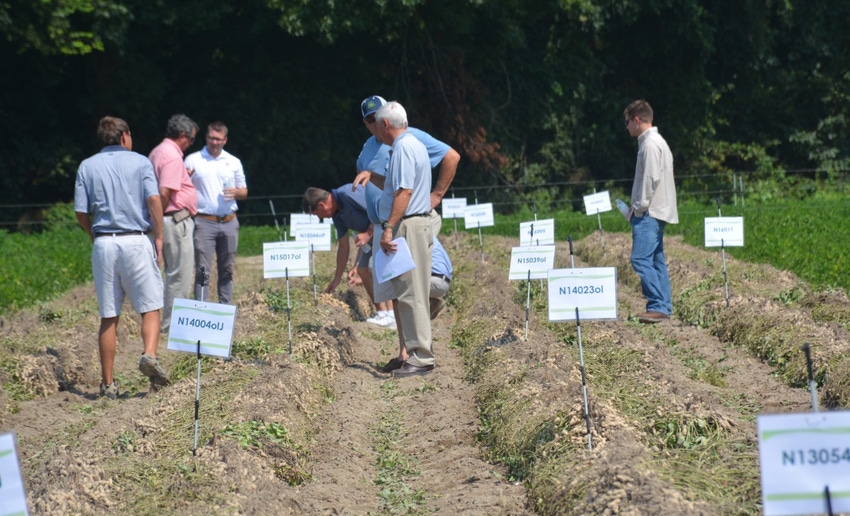
Hurricane Florence forced the cancelation of the Peanut Variety Quality Evaluation (PVQE) Tour on Taylor Slade’s farm in Martin County, N.C., last year so it was great that the weather cooperated, and the tour returned this year. All the varieties and experimental lines featured in the plot looked beautiful.
Slade, who has had a PVQE plot on his farm for more than 40 years now, says he appreciates the information that comes out of the PVQE program. It is a vital part of the pipeline that brings new cultivars to peanut farmers across Virginia and the Carolinas.
“It is always exciting to me to see what comes out of the PVQE test plot and then to be on the committee that reviews those varieties later in the year is even more exciting,” Taylor said at the Sept. 12 tour.
“Thanks to Jeff (Dunne, North Carolina State University’s peanut breeder) and thanks to Tom (Isleib, North Carolina State’s peanut breeder who retired in 2018) we have a future in the peanut industry. It’s a good thing and it’s my pleasure to be a part of it.”
Peanut lines must pass through the PVQE program for testing before they can be released for public use. If a line doesn’t perform well in the PVQE trials, then it will be dropped. The PVQE program is a cooperative effort between producers and scientists at North Carolina State, Virginia Tech and Clemson. It is managed in the same manner as growers manage their own peanut crop.
The PVQE plot has 25 commercial and experimental peanut varieties. Old favorites Bailey, Emery, Sullivan and Wynne are part of the program as is the new high-oleic Virginia cultivar, Bailey II.
A new star in the PVQE trial is Walton, a high-oleic Virginia-type cultivar, released this year by Virginia Tech and the University of Florida.
Dr. Maria Balota of Virginia Tech, who coordinates the PVQE program, notes that Walton offers good agronomic performance compared to Bailey, Emery and Bailey II under “normal” production conditions, but features superior performance to those cultivars under extreme water-deficit conditions. Walton is a high-oleic cultivar with maturity similar to Virginia-type cultivars developed for the Virginia-Carolina region.
Breeder seed is being increased at the University of Florida this year, and more will be produced next year at the Tidewater Agricultural Research and Extension Center in Suffolk, Va., and in Florida. For commercial production, seed will become available at the earliest in 2021.
The PVQE program is valued by all sectors of the peanut industry because it serves as a source of unbiased information of peanut varieties for farmers in Virginia and the Carolinas. Farmers, shellers and processors all have input on the program which ensures that a variety released from the program meets market demands and industry needs.
Field trials comparing peanut breeding lines to commercial varieties are conducted in three states, Virginia, North Carolina, and South Carolina. The multi-state approach is important because it ensures the varieties can perform under varied environmental conditions.
Over the years, Virginia-type peanut varieties have greatly improved in terms of yield, quality and disease resistance. This is due in no small part to the PVQE program. It is vital to the success of providing improved peanut cultivars to farmers across Virginia and the Carolinas. Taylor Slade is spot on: We have a future in the peanut industry thanks in part to the PVQE program.
About the Author(s)
You May Also Like






